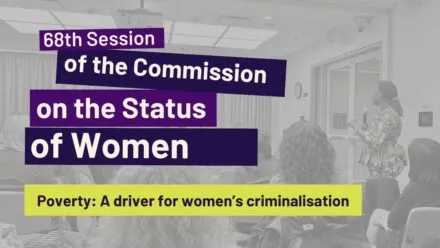One week after International Women’s Day, a coalition of organisations and experts convened to address the rising trend of women’s criminalisation driven by poverty in a side event at the 68th Session of the UN Commission on the Status of Women (CSW) in New York on 15 March. The event highlighted the intersections of gender, poverty, and punitive legal systems, drawing attention to the urgent need for reform, amid a rising female prison population globally.
These five key takeaways offer a glimpse into the global call for action to address the systemic injustices perpetuated by the criminalisation of poverty, particularly impacting women.
- The nexus of gender, poverty and imprisonment: The data presented during the event underscored the alarming reality of women’s imprisonment rates are growing at a faster rate than men globally.
- Criminal justice systems place a disproportionate burden on poor women: The urgent need for holistic approaches to address the root causes of poverty-driven criminalisation of women and provide support services as important steps in breaking the cycle of poverty and imprisonment was made clear.
- Reform is limited by a lack of intersectional analysis: Unfortunately, addressing the intersectional dynamics of criminalisation linked to poverty often remains overlooked in reform efforts towards people-centred justice. This oversight results in some key limitations, impeding the effectiveness of initiatives aimed at rectifying injustices within the criminal justice system.
- Promising practices remain scarce: The event also showcased promising, albeit scarce, practices from various countries.
- A global call for reform: While the challenges are many, the event showcased commitment to making change.
Read the full article: Five takeaways from #CSW68 on the criminalisation of women linked to poverty


